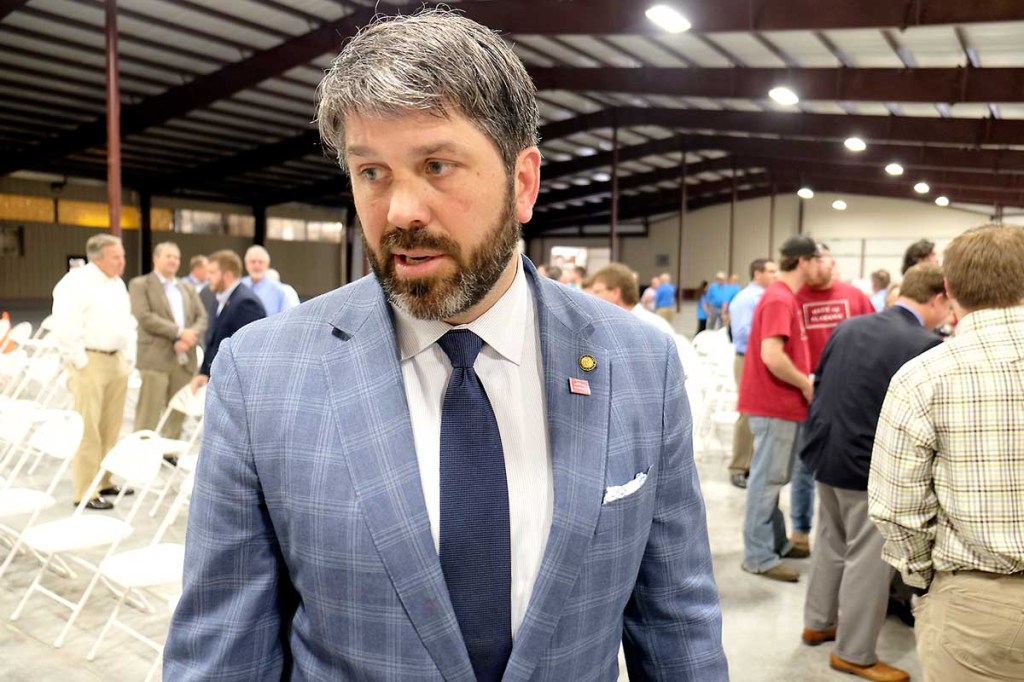Alabama enacts new restrictions on absentee ballot requests
Published 2:30 pm Wednesday, March 20, 2024

- Garlan Gudger at the AGCO ribbon cutting in Bremen in April 2019.
Gov. Kay Ivey signed signed Senate Bill 1, sponsored by Sen. Garlan Gudger (R-Cullman), which prohibits any paid assistance with absentee ballot applications.
“Here in Alabama, we are committed to ensuring our elections are free and fair,” Ivey said in a statement released Wednesday, March 20. “Under my watch, there will be no funny business in Alabama elections.”
Trending
Gudger did not return The Times’ request for comment on Wednesday, but previously said the bill was intended to protect the state from “ballot harvesting,” which he said involves groups seeking to profit from the absentee voting process.
“SB1 will help strengthen Alabama’s absentee voting process while protecting voters who are disabled and protecting our overseas military voters. SB1 will make it illegal to pay or receive payment to assist voters in completing an absentee ballot application or absentee ballot,” Gudger told The Times via a previous text message.
According to The Heritage Foundation, a conservative leaning think tank, there have only been 25 convictions for voter fraud since 2000 in Alabama. Of the cases involving absentee ballots, only two involved any type of financial transfer.
Significant changes have been made to the bill since it was originally filed by Gudger in late 2023. The original bill would only allow voters to designate a person to offer assistance with an absent ballot or ballot application if they were blind or disabled. The current bill rolls back those restrictions and would allow for absentee voting applicants to openly receive assistance as long as they are the ones to sign the application and it is blank when it is handed to them. It also drops the mention of the actual absentee ballots themselves and only applies to applications.
“Any person can still get anyone’s help with applications, but no part of that application can be prefilled. That’s all,” Gudger said on the Senate floor Tuesday.
Sen. Robert Smitherman (D-Birmingham) told Gudger he still had concerns on what he felt was vagueness in the bill’s remaining felony penalties. Anyone who accepts payment or a gift for “distributing, ordering, requesting, collecting, completing, prefilling, obtaining or delivering,” a voter’s absentee ballot application could be found guilty of a Class C felony (punishable by up to 10 years in prison). Charges are increased to a Class B felony (punishable by up to 20 years in prison) for those providing payment.
Smitherman pointed out that the bill does not offer a definition of what would be considered a “gift,” and the term would likely default to being “anything of value.” He said this could be interpreted to target political candidates for supplying campaign volunteers with something as simple as lunch or a bottle of water.
Gudger said the law has what he called “willing intent” built into its language and felt as though Smitherman’s argument was “splitting hairs.”
“I don’t think you’re going to have anybody worrying about that bottle of water or a stamp or splitting hairs on this stuff,” Gudger said.
A federal judge in June blocked a Mississippi law from taking effect that named a short-list of people who can “collect and transmit” an absentee ballot. The judge wrote that the Mississippi law violates the Voting Rights Act, a federal law that says any voter who is blind, disabled or unable to read may receive assistance “by a person of the voter’s choice.”
The Associated Press contributed to this report.
Patrick Camp can be reached at The Cullman Times at 256-734-2131 ext. 238


